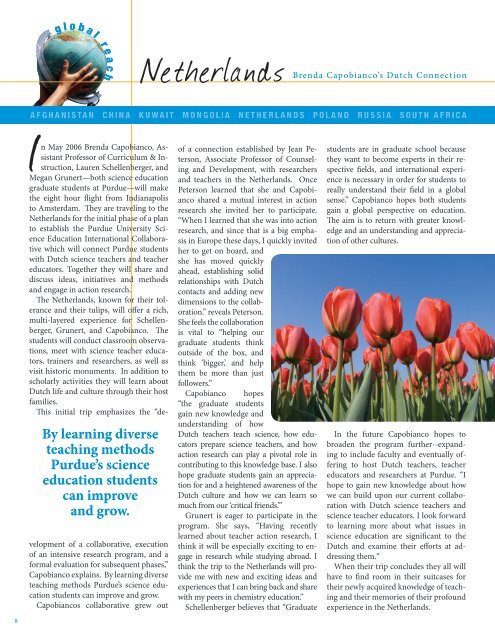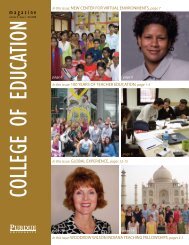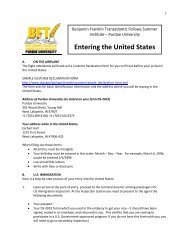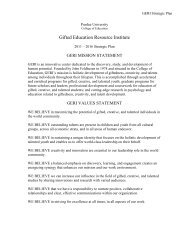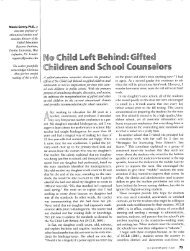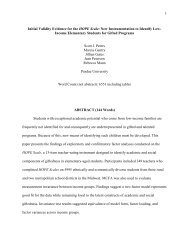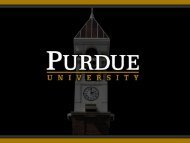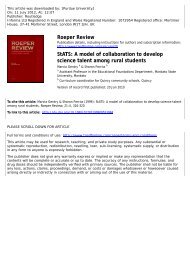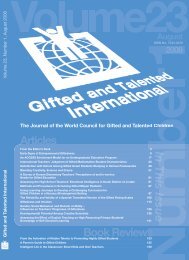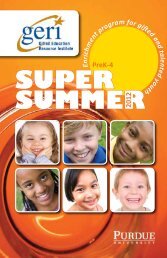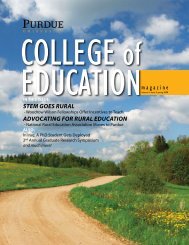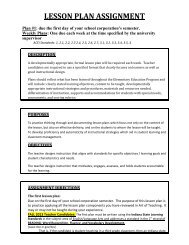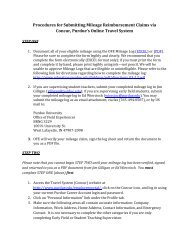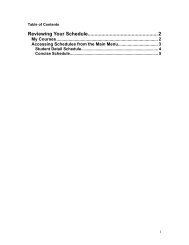In this issue: - College of Education - Purdue University
In this issue: - College of Education - Purdue University
In this issue: - College of Education - Purdue University
Create successful ePaper yourself
Turn your PDF publications into a flip-book with our unique Google optimized e-Paper software.
g<br />
l o b a<br />
l<br />
r e a c h<br />
Brenda Capobianco’s Dutch C onnection<br />
8<br />
By learning diverse<br />
teaching methods<br />
<strong>Purdue</strong>’s science<br />
education students<br />
can improve<br />
and grow.<br />
n May 2006 Brenda Capobianco, Assistant<br />
Pr<strong>of</strong>essor <strong>of</strong> Curriculum & <strong>In</strong>struction,<br />
Lauren Schellenberger, and<br />
Megan Grunert—both science education<br />
graduate students at <strong>Purdue</strong>—will make<br />
the eight hour flight from <strong>In</strong>dianapolis<br />
to Amsterdam. They are traveling to the<br />
Netherlands for the initial phase <strong>of</strong> a plan<br />
to establish the <strong>Purdue</strong> <strong>University</strong> Science<br />
<strong>Education</strong> <strong>In</strong>ternational Collaborative<br />
which will connect <strong>Purdue</strong> students<br />
with Dutch science teachers and teacher<br />
educators. Together they will share and<br />
discuss ideas, initiatives and methods<br />
and engage in action research.<br />
The Netherlands, known for their tolerance<br />
and their tulips, will <strong>of</strong>fer a rich,<br />
multi-layered experience for Schellenberger,<br />
Grunert, and Capobianco. The<br />
students will conduct classroom observations,<br />
meet with science teacher educators,<br />
trainers and researchers, as well as<br />
visit historic monuments. <strong>In</strong> addition to<br />
scholarly activities they will learn about<br />
Dutch life and culture through their host<br />
families.<br />
This initial trip emphasizes the “development<br />
<strong>of</strong> a collaborative, execution<br />
<strong>of</strong> an intensive research program, and a<br />
formal evaluation for subsequent phases,”<br />
Capobianco explains. By learning diverse<br />
teaching methods <strong>Purdue</strong>’s science education<br />
students can improve and grow.<br />
Capobiancos collaborative grew out<br />
<strong>of</strong> a connection established by Jean Peterson,<br />
Associate Pr<strong>of</strong>essor <strong>of</strong> Counseling<br />
and Development, with researchers<br />
and teachers in the Netherlands. Once<br />
Peterson learned that she and Capobianco<br />
shared a mutual interest in action<br />
research she invited her to participate.<br />
“When I learned that she was into action<br />
research, and since that is a big emphasis<br />
in Europe these days, I quickly invited<br />
her to get on board, and<br />
she has moved quickly<br />
ahead, establishing solid<br />
relationships with Dutch<br />
contacts and adding new<br />
dimensions to the collaboration.”<br />
reveals Peterson.<br />
She feels the collaboration<br />
is vital to “helping our<br />
graduate students think<br />
outside <strong>of</strong> the box, and<br />
think ‘bigger,’ and help<br />
them be more than just<br />
followers.”<br />
Capobianco hopes<br />
“the graduate students<br />
gain new knowledge and<br />
understanding <strong>of</strong> how<br />
Dutch teachers teach science, how educators<br />
prepare science teachers, and how<br />
action research can play a pivotal role in<br />
contributing to <strong>this</strong> knowledge base. I also<br />
hope graduate students gain an appreciation<br />
for and a heightened awareness <strong>of</strong> the<br />
Dutch culture and how we can learn so<br />
much from our ‘critical friends.’”<br />
Grunert is eager to participate in the<br />
program. She says, “Having recently<br />
learned about teacher action research, I<br />
think it will be especially exciting to engage<br />
in research while studying abroad. I<br />
think the trip to the Netherlands will provide<br />
me with new and exciting ideas and<br />
experiences that I can bring back and share<br />
with my peers in chemistry education.”<br />
Schellenberger believes that “Graduate<br />
students are in graduate school because<br />
they want to become experts in their respective<br />
fields, and international experience<br />
is necessary in order for students to<br />
really understand their field in a global<br />
sense.” Capobianco hopes both students<br />
gain a global perspective on education.<br />
The aim is to return with greater knowledge<br />
and an understanding and appreciation<br />
<strong>of</strong> other cultures.<br />
<strong>In</strong> the future Capobianco hopes to<br />
broaden the program further--expanding<br />
to include faculty and eventually <strong>of</strong>fering<br />
to host Dutch teachers, teacher<br />
educators and researchers at <strong>Purdue</strong>. “I<br />
hope to gain new knowledge about how<br />
we can build upon our current collaboration<br />
with Dutch science teachers and<br />
science teacher educators. I look forward<br />
to learning more about what <strong>issue</strong>s in<br />
science education are significant to the<br />
Dutch and examine their efforts at addressing<br />
them.“<br />
When their trip concludes they all will<br />
have to find room in their suitcases for<br />
their newly acquired knowledge <strong>of</strong> teaching<br />
and their memories <strong>of</strong> their pr<strong>of</strong>ound<br />
experience in the Netherlands.


